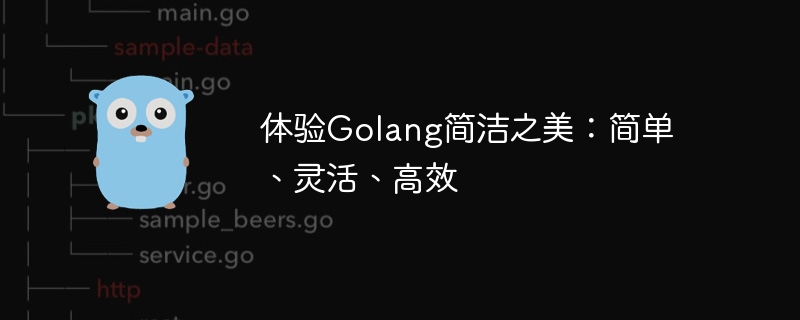

Experience the simple beauty of Golang: simple, flexible and efficient
Go language (Golang) is an open source programming language developed by Google and is designed to be enjoyable , efficient and fast programming language. Golang is favored by developers because of its simplicity, flexibility, and efficiency. It is widely used in cloud computing, big data processing, network programming and other fields. This article will take you to experience the simplicity and beauty of Golang, and demonstrate its simplicity, flexibility, and efficiency through specific code examples.
Golang's syntax design is concise and clear, and the learning curve is relatively gentle, allowing beginners to get started quickly. The following is a simple Hello World program:
package main
import "fmt"
func main() {
fmt.Println("Hello, World!")
}The above code only contains a few lines of code to achieve the function of outputting "Hello, World!". Unlike the cumbersome syntax of other languages, Golang's simplicity makes the code easier to read and maintain.
Golang provides a rich set of standard libraries and third-party packages that can easily implement various functions. At the same time, Golang supports concurrent programming, and efficient concurrent operations can be easily achieved through goroutine and channel. The following is a simple concurrency example:
package main
import (
"fmt"
"time"
)
func main() {
go sayHello()
time.Sleep(1 * time.Second)
}
func sayHello() {
fmt.Println("Hello, Golang!")
}In the above code, a concurrent Hello World program is implemented through goroutine. Golang's concurrency model is simple and easy to understand, allowing developers to easily implement asynchronous operations and concurrency control.
Golang is a compiled language, and the compiled program has excellent performance and fast speed. Golang's garbage collection mechanism effectively manages memory and avoids memory leak problems. The following is a simple performance test code example:
package main
import (
"fmt"
"time"
)
func main() {
start := time.Now()
for i := 0; i < 1000000; i++ {
fmt.Print(i)
}
end := time.Now()
fmt.Println("
Time taken:", end.Sub(start))
}With the above code, you can test the time it takes to print 1,000,000 numbers. Golang's efficient performance makes it perform well in processing big data and high concurrency scenarios.
Summary: Golang’s simplicity, flexibility, and efficiency make it an excellent programming language suitable for various application scenarios. Through specific code examples, we have deeply experienced the simplicity and beauty of Golang. We hope that these contents can help you better understand and use Golang.
The above is the detailed content of Feel the elegance and charm of Go language: simplicity, flexibility and efficiency. For more information, please follow other related articles on the PHP Chinese website!
 Usage of Type keyword in Go
Usage of Type keyword in Go
 How to implement linked list in go
How to implement linked list in go
 What are the Go language programming software?
What are the Go language programming software?
 Zero-based Java self-study tutorial
Zero-based Java self-study tutorial
 How to learn go language from 0 basics
How to learn go language from 0 basics
 How to define variables in golang
How to define variables in golang
 What are the methods to implement operator overloading in Go language?
What are the methods to implement operator overloading in Go language?
 What are the operators in Go language?
What are the operators in Go language?




